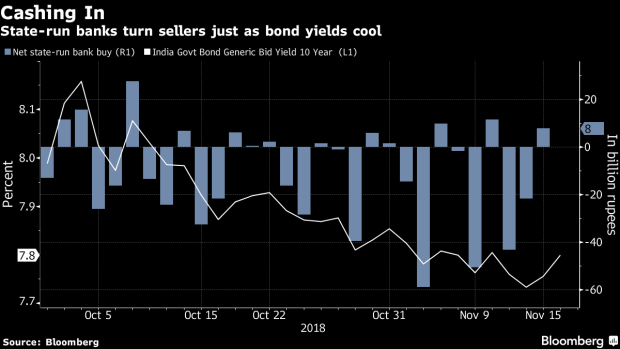Nov 18, 2018
Bonds Face Barrier in India as State Banks Sell Into Every Rally
, Bloomberg News

(Bloomberg) -- India’s sovereign bonds face a conundrum. Every rally hits a wall of selling as the nation’s state-owned lenders, the biggest holders of debt, head for the exit.
Public-sector banks have cut holdings by a net 312 billion rupees ($4.4 billion) this quarter, even as sovereign bonds are poised for their first quarterly advance in more than a year.
They could be forgiven for selling out. The yearlong slide in rupee bonds has left lenders with billions of rupees in losses, prompting them to sell on rallies. State Bank of India, the biggest, saw profits from treasury operations plunge 99 percent to 368 million rupees in the September quarter from a year earlier.
The selling has been particularly severe in the benchmark 10-year bond, which makes up most of the daily volume, causing them to underperform shorter tenor debt. The central bank’s open-market purchases of debt have also been concentrated in the shorter segment, generating more replacement demand in the maturities.
“The benchmark bond has seen some profit-booking from state-owned banks as they had accumulated it at relatively higher yields in the last six months," said Kuldeepsinh Jagtap, senior vice president at ICICI Securities Primary Dealership Ltd. in Mumbai. Yields have since dropped to their lowest level since August, he said.
Read: Crude Seen as Wildcard as Foreigners Return to Indian Bonds
Overseas funds, who have recently returned to Indian bonds, are taking note.
“I’m favoring shorter-term bonds as public sector banks are increasingly conservative in their management of interest-rate risk and now have less demand for longer-duration government bonds,” said Lin Jing Leong, an investment manager in Singapore at Aberdeen Standard Investments, which oversees about $384 billion.
To contact the reporter on this story: Subhadip Sircar in Mumbai at ssircar3@bloomberg.net
To contact the editors responsible for this story: Tan Hwee Ann at hatan@bloomberg.net, Ravil Shirodkar, Nicholas Reynolds
©2018 Bloomberg L.P.